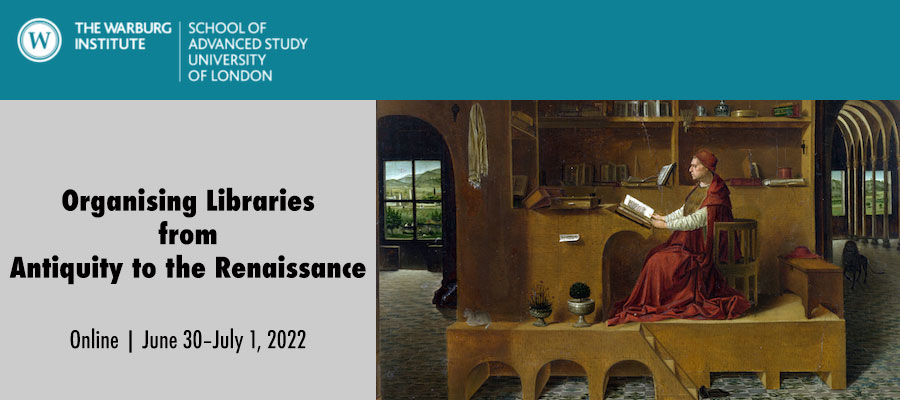Organising Libraries from Antiquity to the Renaissance, The Warburg Institute Online, June 30–July 1, 2022
In his Avis pour dresser une bibliothèque (Paris, 1627), Gabriel Naudé famously said that, without order, a "collection of books, were it of fifty thousand Volumes, would not more merit the name of a Library, than an assembly of thirty thousand men the name of an Army unless they be martialled in their several quarters under the conduct of their Chiefs and Captains". Classification and organisation systems are vital to the functioning of any library, as they grant readers the ability to access the collection(s) to find exactly the books—and, as a consequence, the information—they are looking for.
Throughout history, book collectors and librarians have established a variety of classification systems that would allow them to store books in an orderly fashion and, more importantly, make them retrievable when the need arose. These systems could be reflected in catalogues, in the volumes themselves, which sometimes bear traces of the shelfmarks they were assigned, or in other paratextual annotations that speak of their position within a collection or their physical collocation in the room(s) they were deposited in. Classification systems were not fixed once and for all, but changed following the growth and the dispersal of collections and the whim of book owners or alongside cultural and historical trends.
Nonetheless, each system records a particular way of viewing the world and its knowledge, establishing—explicitly or implicitly—a hierarchy of subjects and topics: therefore, researching these systems is a way to explore historical structures of knowledge and study developments in intellectual life.
The workshop aims to bring together scholars from the fields of Classics and ancient Mediterranean studies, and of Mediaeval, Byzantine and Renaissance studies to share their research on the history of book collections and libraries and engage in a dialogue on cultural patterns, shifts, and revivals at the intersection of different traditions.
The workshop will take place in two sessions, each one starting at 2pm. Two panels of speakers will be presenting about significant case-studies of community libraries and individual ones. A moderated round-table discussion will follow the second panel on July 1st, closing the wokshop’s activities.
Organised by Rheagan Martin (CASVA Center for the Advanced Study in Visual Arts Predoctoral Fellow), Ottavia Mazzon (Frances Yates Long-term Fellow), and Raphaële Mouren (Head of Research Collections, British School at Rome, and Senior Research Fellow, the Warburg Institute).
Advance registration required.
